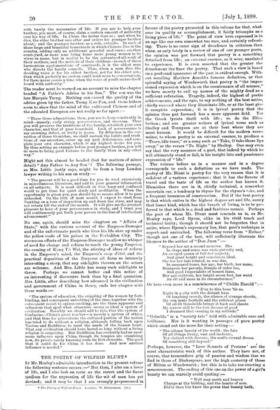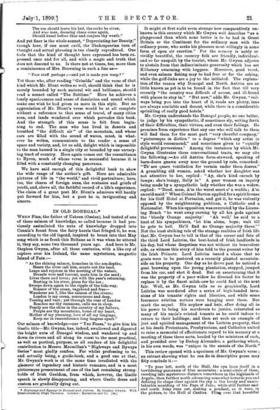THE POETRY OF WILFRID BLUNT.*
IN Mr. Henley's admirable introduction to the present volume the following sentence occurs :—" But then, I also am a lover of life, and I also look on verse as the rarest and the finest medium for the expreesion of life the wit of man has yet devised; and it may be that I am strongly prepossessed in
• The Poetry of Wind Blunt. London : W. Heinemann. [615.]
favour of the poetry presented in this volume for that, what- ever its quality as accomplishment, it fairly triumphs as a living piece of life." The point of view here expressed is in an age like our own somewhat too rare, and certainly refresh- ing. There is no surer sign of decadence in criticism than when, as only lately in a review of one of our younger poets, the opinion was pat forward that poetry is a something detached from life; an external essence, as it were, unrelated to experience. It is even asserted that the greater the detachment the finer the poetry. That such a view is based on a profound ignorance of the past is evident enough. With- out recalling Matthew Arnold's famous definition, or that splendid saying of Wordsworth that poetry is "the impas- sioned expression which is on the countenance of all science," we have merely to call up names of the mighty dead as a sufficient refutation. Tragedy, indeed, the highest of poetic achievements, and the epic, to say nothing of the best satire, chiefly succeed where they illuminate life, or at the least give it complete expression ; it is in lyrical poetry that the opinion thus put forward has a more apparent field. Yet
the Greek lyrists thrill with life ; so do the Eliza- bethan; and our greater writers of lyrical verse such as Shelley and Tennyson are at their best where they are most human. It would be difficult for the modern verse-
writer, to whom poetry is an external essence, to produce a "Tears, idle tears," or a song such as "Take, 0 take those lips away," or the verses "To Night" by Shelley. One may even say that the very measure of a poet, that indeed by which he will ultimately stand or fall, is his insight into and passionate expression of "life."
The volume before us in a manner and in a degree corresponds to such a definition as we have made. The poetry of Mr. Blunt is poetry for the very reason that it is redolent of a various experience ; that it has the flavour of travel and the taste of life as the author has known it.
Blemishes there are in it, chiefly technical, a somewhat
uncertain ear, a tendency to rhyme for the rhyme's aake, and a frequent looseness of construction. But if the beat poetry is that which unites in the highest degree. art and life, surely
that lesser kind, which has the breath of living, is to be pre- ferred to that which is a dead and faultless mosaic. Perhaps the poet of whom Mr. Blunt most reminds us is, as Mr.
Henley says, Lord Byron, alike in his vivid touch and technical laxity; though it should not be forgotten that in
satire, where Byron's supremacy lies, that poet's technique is superb and unrivalled. The following verse from "Esther," though not one of the best, will sufficiently illustrate the likeness to the author of "Don Juan" :—
" Beyond her sat a second monster. She
In shape and sense was undisguisedly real, An ox-eyed queen of full-fed majesty, And giant height and comeliness ideal.
She too her tale related, as was due,
In measured tones, her age, her birth, her name,
Bourgeois her parents, friends of order too, And good Imperialists of honest fame,
Her age eighteen, her height seven feet, her waist
An ell and more in its circumference."
Or here even more is a reminiscence of " Childe Harold " " E'en to this hour 'tis so.
Night in a city with the distant hum Of laughing crowds, the silence of strange streets, My own mute footfalls and the redolent gloom Of oil-lit thresholds brings it back and cheats My sorrow still to the lost dreams of good I dreamed that evening in my solitude."
" Griselda " is a "society tale" told with admirable ease and brilliance. Nor is it wanting in passages of pure poetry which stand out the more for their setting:—
" The solemn beauty of the world : the fate Of all things living, vast and inchoate,
"Yet clothed with lowers; the soul's eternal dream Of something still beyond." '
Perhaps, however, the "Love Sonnets of Proteus ' ar.e the
most characteristic woik of this author. They have not, of course, that tremendous grip of passion and wisdom that we find in those of Shakespeare, nor the high austerity of those of Milton or Wordsworth ; but this is to take too exacting a measurement. The ending of this one on the power of a girl's
beauty we can acarcely avoid quoting :— "Well may earth and heaven
Change at thy bidding, and the hearts of men. Did'st thou but know the power that beauty bath, The sea should leave his bed, the rocks be riven, And wise men, deeming chaos come again. Should kneel before thee and conjure thy wrath."
And yet finer is the whole sonnet, "Depreciating her Beauty," though here, if one must cavil, the Shakespearian turn of thought and actual phrasing is too closely reproduced. One feels that the kind of thought here expressed has been ex- pressed once and for all, and with a magic and truth that does not descend to us. Is there not at times, too, more than a reminiscence of Mrs. Browning in such a line as- " Poor stuff perhaps ;—and yet it made you weep ?"
Yet those who, after reading "Griselda" and the verse of that kind which Mr. Blunt writes so well, should think that he is merely bounded by such natural wit and brilliance, should read a sonnet called "The Sublime." Here he achieves a lonely spaciousness and sense of desolation and sound which make one wish he had given us more in this style. But no appreciation of Mr. Blunt's verse would be at all complete without a reference to that sense of travel, of many cities seen, and lands wandered over which pervades this book. And the strength of this sense is felt from begin- ning to end. The man who has lived in deserts and breathed "the difficult air" of the mountain, and whose ears are filled with the sound of waves, must, in what- ever he writes, communicate to the reader a sense of space and variety, and, let us add, delight which is impossible to the man housed in a single city or bounded by one unvary- ing tract of country. Here again comes out the resemblance to Byron, much of whose verse is successful because it is filled with a constantly changing panorama.
We have said enough of this delightful book to show the wide range of the author's gift. Here are admirable pictures of life in "the world," and vivid portraiture; here, too, the charm of foreign suns, the ecstasies and griefs of youth, and, above all, the faithful record of a life's experience. The claim of a great poet Mr. Blunt's admirers will hardly put forward for him, but a poet he is, invigorating and sincere.
















































 Previous page
Previous page